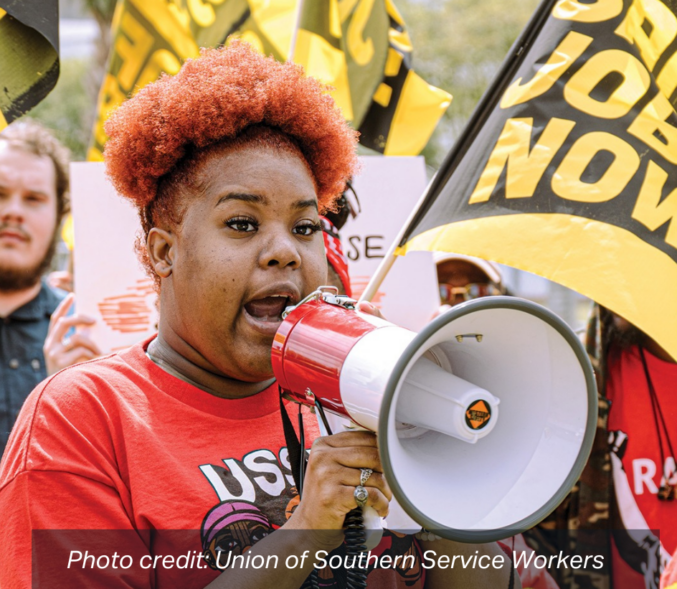Worker Centers Are Building Worker Power
Through worker centers, workers build collective power to drive change locally and in the broader economy. NELP is committed to helping worker centers build capacity.

Worker Centers’ Role in a Good-Jobs Economy
In a good-jobs economy, workers use their power to collectively shape workplace rights, protections, and benefits. Worker centers play a key role in supporting the power built by workers organizing in their workplaces and communities.
What is a Worker Center?
Worker centers are spaces where groups of workers organize and build long-term power. Worker centers directly engage impacted people to build power around issues related to work. As base-building organizations, they advance worker issues in a holistic way—building power through workplace organizing campaigns and broader policy campaigns that affect entire communities.
Worker centers are often member-based, democratic institutions engaged in raising political consciousness in worker communities through popular education.
Strengthening the Worker Center Movement
Workers are organizing through worker centers to make change, but they face challenges. Not only do workers face uphill political battles when seeking to confront corporate power, but worker centers often have few resources and limited staff. Although there are some national networks, too many organizations are operating in silos, without robust ecosystems and infrastructure to support their efforts.
As a national organization, NELP is working to:
- bring worker centers together
- build movement infrastructure
- increase organizational capacity
We believe that for workers to build power in a sustained way, they need strong organizations to support their efforts. Through our capacity-building support of worker centers, we are helping workers build resilient organizations.
NELP’s Support for Worker Centers
We’re committed to supporting worker centers in the following ways:
Capacity-building: We provide legal support that helps worker centers build their organizational infrastructure.
Engaged partnerships: We provide policy, research, communications, and legal support to advance worker center campaigns. We also provide thought partnership to worker centers to think through their strategies.
Network-building: We connect worker centers with each other so they can collaborate and share learnings. We also connect worker centers with other allies—including unions, foundations, and policy organizations.
Strategic enforcement: We help worker centers ensure their members’ labor rights are being enforced at work through our strategic enforcement partnership programs.
Advancing pro-worker policies: We advocate for policies that advance workplace protections for workers who are organizing through worker centers. These include the enforcement of existing anti-retaliation laws, deferred action for immigrant workers involved in labor disputes, and just cause job protections.
Our Commitment to Supporting Worker Centers
of the 66 worker centers that NELP supported in 2022 and 2023 received in-depth support—including legal representation, strategic campaign support, and organizational coaching.
new worker centers are working with NELP to get off the ground. NELP is providing them with the support they need to build sustainable organizations.
workers centers are using a model NELP developed that creates multi-entity organizations with sister labor organizations, to support workers organizing for direct worksite improvements.
Related News
Workers Rights Organizations Condemn the Dismantling of Workplace Civil Rights Enforcement Agency

News Release
March Jobs Report: Immigrant Workers Power a Steady Economy, Full Impact of Trump Policies Yet to Come

News Release
NELP Urges New York Governor Kathy Hochul to Delay Flawed Transition of Medicaid CDPAP Homecare Program to Avoid Harm to Clients and Workers

News Release
